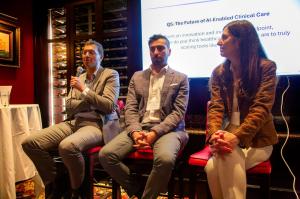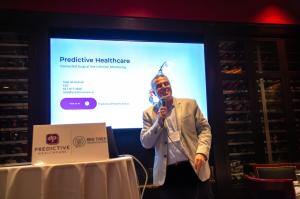AI in Healthcare: Clinical Perspectives From the Frontlines

A panel of leading surgeons and innovators discusses the future of AI-enabled clinical care during Predictive Healthcare and Big Tree Innovation Fund’s Boston event. Featuring Dr. Edward Kobraei (left), Dr. Chris Homsy (middle), Dr. Theofanie Mela (right).
Boston healthcare leaders shared how AI tools like MyHealthPal are transforming post-op care, improving outcomes, and easing clinical workload.
Jeff Berman, Co-Founder and Managing Partner of Big Tree Innovation Fund, opened the evening by voicing his support for advancing meaningful AI innovation in healthcare. He highlighted that “The future of healthcare doesn’t get built in a silo. It’s clinicians who feel the pain points, innovators who obsess over solutions, and investors with the conviction to bring it all together.” Commending Predictive Healthcare’s work, Berman called MyHealthPal, “A powerful leap forward” that is “practical, scalable, and impactful.” As he put it, “At Big Tree, we back founders who solve real problems. Not theoretical ones, not incremental ones, but problems that keep providers up at night and cost the system billions.”
Professor Gary Young, PhD, JD, Director of the Center for Health Policy and Healthcare Research at Northeastern University, delivered a powerful keynote on the rapidly growing role of artificial intelligence in modern medicine. “The global market for AI in healthcare is massive and expanding rapidly,” he noted, “a sign of how much potential innovation has to improve outcomes and reduce inefficiencies.” He went on to emphasize that “after years of cost pressures in healthcare, we finally have the technological capabilities to respond intelligently: Through predictive analytics, automation, and better care coordination.”
Following the keynote, Talal Ali Ahmad, three-time founder and CEO of Predictive Healthcare, presented MyHealthPal, an AI-powered wound monitoring and patient triage platform designed to reduce surgical site infections (SSIs) and improve post-operative recovery. Rather than sending patients home with a paper checklist, MyHealthPal allows them to securely upload photos of their incision sites, which are analyzed by Predictive’s FDA-listed AI algorithm to flag early signs of infection. “Instead of hoping patients notice symptoms on their own, AI gives them real-time guidance and reassurance: Reducing unnecessary calls and visits while improving outcomes,” said Ahmad. “AI isn’t replacing clinicians; it’s extending their reach, connecting patients and providers continuously, and helping them make better, faster decisions.”
The highlight of the evening was a renowned panel of top surgeons featuring Dr. Theofanie Mela (Mass General Brigham), Dr. Christopher Homsy (Tufts Medical Center), and Dr. Edward Kobraei (Kaiser Permanente), who shared their firsthand experiences using MyHealthPal and broader perspectives on AI in patient triage in surgical care.
Dr. Kobraei highlighted the urgent need for visibility after discharge: “We perform complex operations and then tell patients, ‘good luck.’ AI helps bridge that blind spot in recovery, showing us who really needs attention.” Dr. Kobraei also noted that “the future of healthcare is in the home. Hospitals should treat the most complex problems, while AI enables continuous care remotely.” Dr. Kobraei added, “I tested Predictive’s AI on over 400 real-world wound images, and it’s improving every day. The more diverse data we train it with, the better it gets.”
Dr. Theofanie Mela reflected on the trust and value she’s built with patients while conducting the MyHealthPal study. She acknowledged that while some patients may initially hesitate to share data, education and transparency help bridge that gap. “The more information and training we provide, the more we can rely on AI tools to truly support patient health and care,” she said. Looking ahead, Dr. Mela emphasized the importance of using data responsibly, noting, “We have a lot of unmet needs. The more data we collect, the more we must use it carefully, efficiently, and for the best care of our patients - and for the efficiency of the healthcare system.”
Dr. Christopher Homsy underscored the urgency of integrating AI into clinical workflows today rather than waiting for the future. He noted that AI is already capable of streamlining essential but time-consuming tasks such as transcribing progress notes, reading imaging, identifying wound infections, and even exploring how to automatically generate CPT codes from operative notes to reduce administrative burden. Reflecting on the accelerating transformation with healthcare, Dr. Homsy shared, “There’s big momentum right now — every industry is embracing AI, and healthcare is no exception. This is the right time to think about it, invest in it, and learn about it.”
Panelists agreed that AI’s role in clinical care is no longer theoretical: It’s practical, scalable, and urgently needed. As Dr. Kobraei put it, “The healthcare workforce is exhausted, demand is growing, and adoption isn’t optional anymore, it’s inevitable.”
The key takeaway from the evening was that AI is not just the future of healthcare; it’s here now, enhancing recovery and reshaping how clinicians connect with their patients.
Predictive Healthcare continues to be a leader in driving remote patient care using its AI-driven MyHealthPal platform, a patented and HIPAA compliant FDA class-one application. If interested to learn more, please contact talal@predictivecare.ai.
Hailey Koppelman
Predictive Healthcare
+1 631-258-5199
email us here
Visit us on social media:
LinkedIn
Instagram
YouTube
What is MyHealthPal?
Legal Disclaimer:
EIN Presswire provides this news content "as is" without warranty of any kind. We do not accept any responsibility or liability for the accuracy, content, images, videos, licenses, completeness, legality, or reliability of the information contained in this article. If you have any complaints or copyright issues related to this article, kindly contact the author above.


